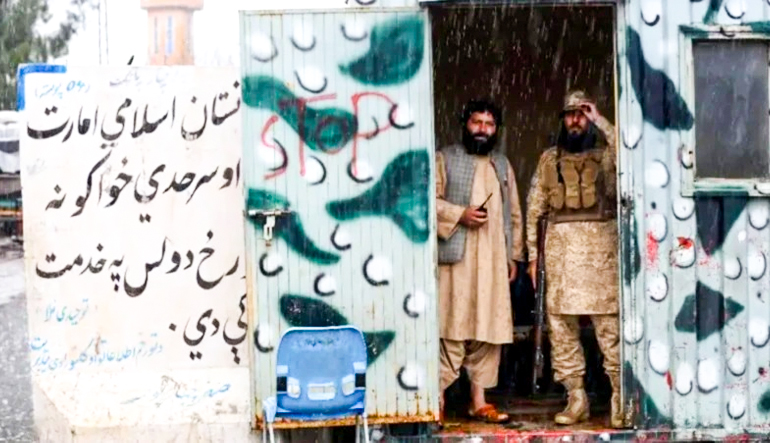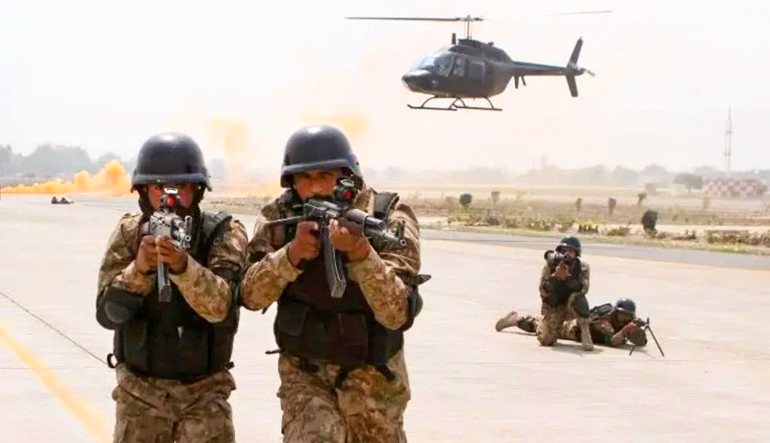

On March 11, just five days after the terrorist attack on the Jaffer Express in Pakistan’s Baluchistan province, a bomb explosion in Nushki killed five people, including three security forces personnel, and injured 32 others. Meanwhile, in Khyber Pakhtunkhwa, nearly a dozen attacks by armed militants within two days highlight the rising threat of extremist violence and growing insurgency in the region. This wave of militant group activity, which has been ongoing for some time, has intensified in the new year, escalating threat levels and raising concerns about public safety. Given the evolving geopolitical shifts, Pakistan’s law enforcement agencies and the Pakistan Army face mounting challenges in their counterterrorism efforts. With regional security at risk, the question arises: How is Pakistan’s government strategizing to combat radicalization and curb this new surge of violence? In this article, we posed this critical question to experts.
Border relations, regional diplomacy, and geopolitical tensions have once again come under focus following the Jaffer Express attack in Pakistan’s Baluchistan province on March 11. Pakistan Army spokesperson, DG ISPR, Lieutenant General Ahmed Sharif, claimed that "these terrorists were in contact with their facilitators and masterminds in Afghanistan via satellite phone during the operation." This statement led to a strong denial from Afghanistan’s Ministry of Foreign Affairs, which urged Pakistan to address its internal border security issues. Pakistan has also accused India of engaging in cross-border conflicts and destabilizing activities, including supporting Baloch separatists. However, India has rejected these allegations, emphasizing the importance of bilateral ties and diplomatic engagement. So, how much of a challenge do "difficult neighbors" pose for Pakistan in the current situation? In response, senior politician and defense analyst Senator Mushahid Hussain Syed highlighted the role of security cooperation in counterterrorism, stating, “Even when the U.S. military was present in Afghanistan, the situation was not favorable for Pakistan but rather hindered its efforts.” He further pointed out that “Pakistan’s diplomatic negotiations with Afghanistan have failed to yield positive results.” He elaborated that Pakistan had assumed that the Afghan Taliban government would prioritize regional stability and maintain friendly relations due to past support. However, the trade and economy dynamics between the two countries did not improve as expected. “Afghan soil is currently being used against Pakistan, which is a major challenge,” he added, reinforcing concerns about ongoing cross-border conflicts. According to him, “Even during the American presence, India had established terrorist bases in Afghanistan to operate against Pakistan, and the U.S. was aware of it but did not intervene.” This statement aligns with Pakistan’s concerns about geopolitical tensions affecting its internal security. On the other hand, senior journalist and analyst Iftikhar Firdous emphasized that “Pakistan is not isolated in its fight against terrorism. The world has acknowledged Pakistan’s security cooperation efforts, as seen when the U.S. government praised Pakistan’s counterterrorism initiatives.” It is worth noting that in an address to Congress, former U.S. President Donald Trump stated that the main terrorist responsible for the suicide attack on American personnel at Kabul Airport during the 2021 Afghanistan withdrawal had been captured, and he expressed gratitude to the "Government of Pakistan" for its assistance in this regard. Iftikhar Firdous further highlighted that the role of other regional diplomacy efforts, particularly involving superpowers like China and Russia, will be crucial in eliminating terrorism. Senator Mushahid Hussain Syed also emphasized the need for a regional stability approach in counterterrorism strategies. He pointed out that countries such as China, Russia, Iran, Turkmenistan, and Uzbekistan share concerns about terrorism originating from Afghanistan, as it poses a threat not only to Pakistan but to the entire region. Additionally, he stressed the importance of leveraging the Shanghai Cooperation Organization’s (SCO) Regional Anti-Terrorism Structure (RATS), which Pakistan has yet to fully utilize. Lastly, he suggested that Pakistan should take steps to expose India’s involvement in cross-border conflicts and geopolitical tensions at the United Nations Security Council (UNSC), similar to how Canada and the U.S. have recently raised concerns about Indian activities.

Terrorist incidents and security operations to counter them are not new in Pakistan. Since 2001, terrorist attacks have gradually increased, peaking in 2007, and culminating in the tragic 2014 attack on the Army Public School (APS) in Peshawar, which was considered the most devastating incident of that time. However, the recent surge in terrorist activities, both in frequency and intensity, is once again reviving memories of that dark era of unrest and horrifying violence, amplifying concerns about public opinion manipulation and narrative shaping through digital propaganda and misinformation tactics. Senior journalist and analyst Iftikhar Firdous states, “If we compare Pakistan’s terrorism-related statistics from 2024 and the current year with those from 2014 and 2009, the recent incidents are significantly more severe. However, we have failed to adapt to the evolving landscape of hybrid warfare and disinformation campaigns.” “In 2001, we were the frontline ally of the United States, and the world’s attention was on Pakistan. At that time, Pakistan was transitioning from Musharraf’s dictatorship to democracy, with a degree of political consensus. All provinces and political parties had representation in Parliament, and their interests were more or less aligned, allowing for effective strategic communication.” According to him, by 2021, "Pakistan not only lost international focus but also saw a gradual decline in global funding for counterterrorism after 2018." This lack of support, combined with a shift in geopolitical narratives, has weakened Pakistan’s position in tackling extremist threats. “Over time, we did not evolve. We are still dealing with terrorism as if it were 2001, 2009, or 2014, whereas those we are fighting have adapted their strategies. They now possess sophisticated propaganda networks, modern technology, and effective perception management tactics.” He emphasized that political stability is the most crucial factor in an effective counterterrorism strategy. "Due to political instability, the state's narrative shaping fails to gain public trust. As a result, decision-making becomes difficult, implementation of decisions is hindered, and even when actions are taken, they often face intense public backlash, further exacerbating the war of narratives."

Counterterrorism strategy and national security policy remain crucial for Pakistan in addressing the resurgence of terrorism. In response to this challenge, Senator Mushahid Hussain Syed emphasized that "Pakistan needs to develop a strategy that can effectively counter this new wave of terrorism through strategic planning and risk mitigation." He stated, "Neither in the past nor now have we had a clear and effective counterterrorism strategy at the official level. Instead, our approach has always been reactive rather than focused on preventive measures and threat assessment." Elaborating on his point, he explained, "Whenever a major terrorist incident occurs, the state reacts. Whether it was the killing of Chinese nationals in October 2024, the attack on Bannu Cantonment two weeks ago, or the tragic train attack in Baluchistan, the pattern remains the same—a reaction follows these incidents, but there is no long-term security framework or tactical response in place to prevent such attacks in the future." He stressed the need for "a comprehensive and effective defense mechanism and law enforcement coordination at the government level," recalling that an institution like NACTA (National Counter Terrorism Authority) was created precisely for this purpose but has not been fully utilized in intelligence operations and crisis management. Former NACTA chief Ehsan Ghani pointed out that after the decline in terrorism in 2018, "there was a crucial need for political leadership to introduce legislative reforms that could address societal and economic conflicts, ensuring that such situations do not arise again." He said, "By 2018, extremism had significantly decreased, but the political leadership failed to take the necessary steps to sustain this progress and reinforce political stability." "The individuals and leaders of that time moved on—one government left, another took over, and even the military and ISI leadership changed—leaving a gap in conflict resolution and long-term security planning."
After the Jafar Express attack, political stability became a central concern as Prime Minister Shehbaz Sharif, during his visit to Quetta on Thursday, announced plans to hold an All Parties Conference (APC). However, details regarding its exact date and agenda have yet to be disclosed, raising questions about governance challenges and the effectiveness of policy reforms in addressing security threats. Experts emphasize the importance of national unity and political consensus in addressing the current crisis. Senator Mushahid Hussain stated, "A key part of our national security policy should be addressing internal political stability. We need a healing touch, which includes the release of all political prisoners, including Imran Khan, and the recovery of missing persons, essential for institutional trust and state legitimacy." He claimed that "taking these steps would achieve 50% of the mission to bring internal stability, ultimately strengthening an effective counterterrorism strategy. Currently, Khyber Pakhtunkhwa and Baluchistan are experiencing unrest, and both are sensitive regions. For an effective security framework, we must act swiftly on these issues to move forward." Journalist Iftikhar Firdous underscores the urgency of a national dialogue as part of broader public policy debates. "The most crucial step is to engage all political parties in the fight against terrorism, particularly those dissatisfied with the system. Opposition engagement and bringing them to the negotiation table while securing public support is essential for long-term conflict resolution." "The Pakistan Army has repeatedly stated that this war is not just the military’s fight but also the people’s. A national counterterrorism dialogue is urgently needed to ensure democratic governance and prevent further deterioration of civil-military relations." He further pointed out, "Following the attack on the Peshawar Police Lines, a national conference was proposed but never materialized. The APC has been announced after the Jafar Express attack, yet there has been silence on its implementation, raising concerns about power dynamics and electoral integrity in shaping future security policies."
Powered by Froala Editor